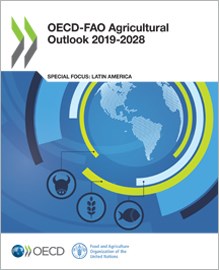Agricultural output growth to keep food prices low over the coming decade, but many uncertainties are ahead.

Global demand for agricultural products is projected to grow by 15 percent over the coming decade, while agricultural productivity growth is expected to increase slightly faster, causing inflation-adjusted prices of the major agricultural commodities to remain at or below their current levels, according to an annual report by the Organisation for Economic Co-operation and Development and the UN’s Food and Agriculture Organization.
This year’s edition of the OECD-FAO Agriculture Outlook, presented in Rome today, provides a consensus assessment of the 10-year prospects for agricultural and fish commodity markets at national, regional and global levels.
“Global agriculture has evolved into a highly diverse sector, with operations ranging from small subsistence farms to large multinational holdings,” FAO Director-General José Graziano da Silva and OECD Secretary-General Angel Gurría write in the Foreword of the report. Along with providing food, they added, today’s farmers “are important custodians of the natural environment and have become producers of renewable energy.”
The Outlook projects that yield improvements and higher production intensity, driven by technological innovation, will result in higher output even as global agricultural land use remains broadly constant. Direct greenhouse gas emissions from agriculture, meanwhile, are expected to grow by some 0.5 percent annually over the coming decade, below the 0.7 percent rate of the past 10 years, and below the projected output growth rate – indicating declining carbon intensity.
At the same time, new uncertainties are emerging on top of the usual risks facing agriculture. These include disruptions from trade tensions, the spread of crop and animal diseases, growing resistance to antimicrobial substances, regulatory responses to new plant-breeding techniques, and increasingly extreme climatic events. Uncertainties also include evolving dietary preferences in light of health and sustainability issues and policy responses to alarming worldwide trends in obesity.
Read more on the website of the OECD
Read the summary